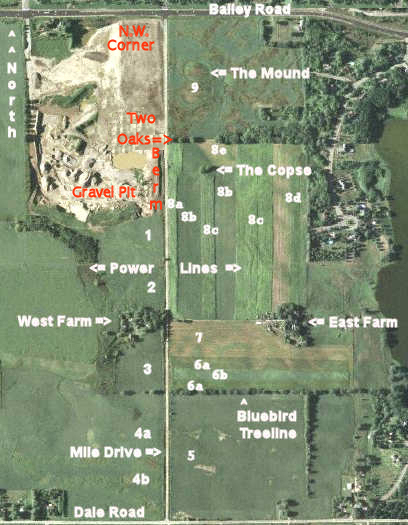
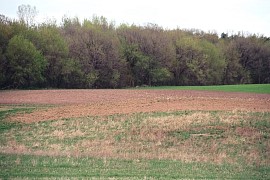
|
|
Emerging from the tree line extending from Two Oaks is a deer. Wild turkeys also inhabit this area.
I saw many of them in this spot in the fall of 2005, none all of 2006, and then again
in the spring of 2007. A coyote mother had her den in the woods here in 2006, so maybe she
chased off (or ate) the turkeys.
|
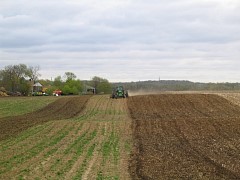
|
|
The elderly farmer is discing Field #7. As far as I can tell, all the fields
along the road have now been prepared for planting.
|
|
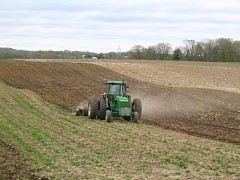
It's cold today. Just after I took this picture, the elderly farmer got off his tractor to talk to
me. I suppose he notice me taking pictures. He told me this winter he always saw a guy in a hooded
coat out walking on the road - I told him it was me. The farmer shared that he was 82. I asked him
about the pocket gopher mounds. He told me that he always rotated corn and beans, because otherwise
you can get corn borers. By rotating your crop, if they start to get a foothold one year, there is
no corn roots for them the next. He said his father was born on a farm within this section. He told
me in other years he had leased and farmed Field #9 - and he had planted crops on The Mound.
He knew who owned what and who leased and
farmed what. He didn't like the county flooding his land for the runoff water drainage - so-called
Bailey Lake. He sold
his land when he didn't think he could farm it anymore because of illness, but since he has recovered
he leases it back for many years and farms it.
|
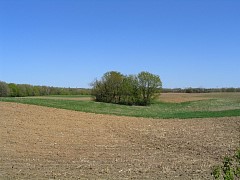
The Copse has leafed out.
|
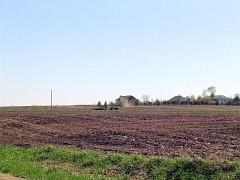
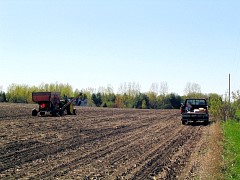
Across Dale Road the farmer is planting. He keeps sacks of seed in the pickup bed and stops by
whenever he needs to fill the seed hoppers. I am not sure what's in the wagon attached to the
tractor - maybe more seed, or more likely fertilizer or weed killer.
|
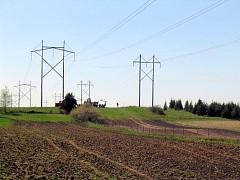
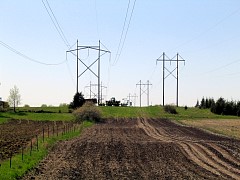
The guy farming Field #2 #3 #4a stops to load his seed hoppers. Last year he had this planted in corn,
so most likely he is planting soybeans.
|
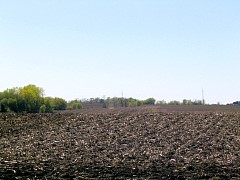
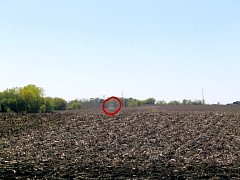
|
|
If you look at the center of the picture, then to the left you will see a dust devil. I
produced a second photo and circled the dust devil. A dust devil is essentially
a mini-tornado of dirt and dust. I watched this devil move from right to
left until it finally dissolved. Again, as with all these pictures, I am recording what I
see and not necessarily posting mind-boggling photos.
A dust devil or whirlwind is a rotating updraft, ranging from small (half a meter wide and a
few meters tall) to large (over 10 meters wide and over 1000 meters tall).
Dust devils form when extremely hot air near the surface rises quickly through a small
pocket of cooler low pressure air above it. If conditions are just right, the air may
begin to rotate. As the air rises suddenly, the column of hot air is stretched vertically
causing intensification of the spinning effect by the scientific principle conservation of
angular momentum. The spinning effect will cause other hot air to speed horizontally inward
to the bottom of the newly forming vortex. As more hot air rushes in toward the developing
vortex to replace the air that is rising, the spinning effect becomes further intensified
and self-sustaining. A dust devil, fully formed, is a funnel-like chimney through which hot
air moves both upwardly and circularly. Eventually the hot air will cool and descend back
through the center of the vortex. This cool air returning acts as a balance against the
spinning hot air outer wall and keeps the system stable.
The spinning effect, along with surface friction, usually will produce a forward momentum.
The dust devil is able to sustain itself longer by moving over nearby sources of hot surface
air. Dust particles sucked into the air will create drag and act to slow the system down.
Dust devils, even small ones can produce radio noise via electrical fields.
|
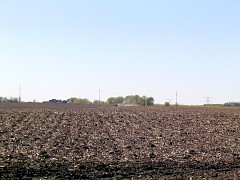
The farmer has loaded his seed and is planting off in the distance. You can see the amount of
dirt and dust the planting is raising - it has been dry all of April.
|
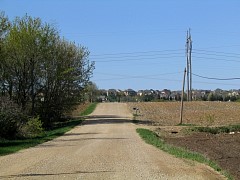
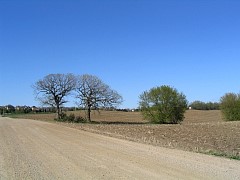
Heading north on the road.
|